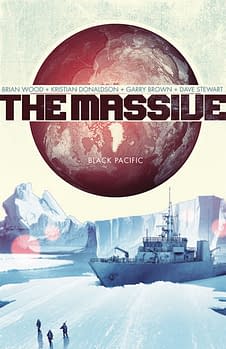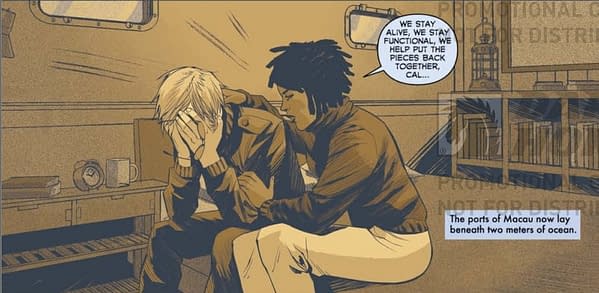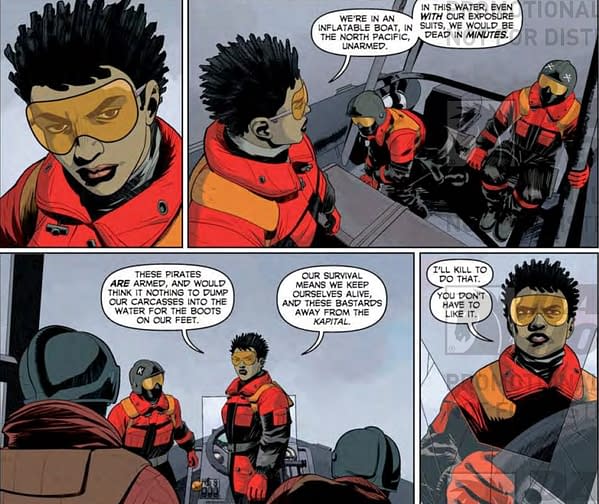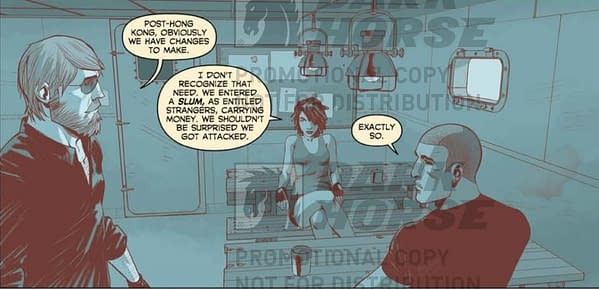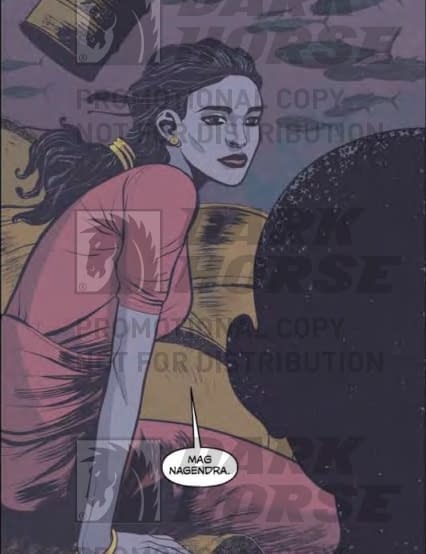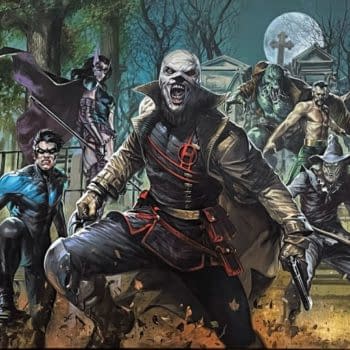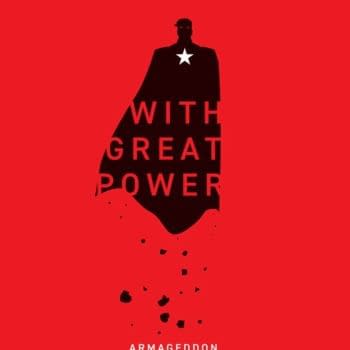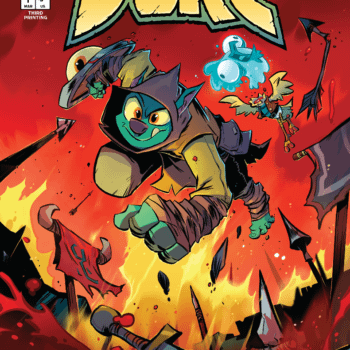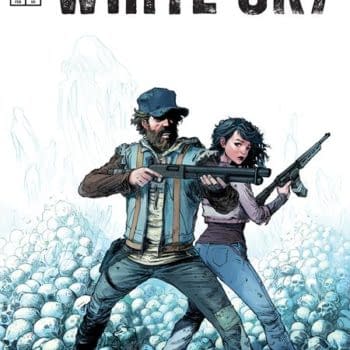Posted in: Comics, Recent Updates | Tagged: brian wood, dark horse, Garry Brown, Jared K. Fletcher, kristian donaldson, massive, The Massive
The Massive Awakes
I'm a sucker for John Wyndham novels and my favorite by far is The Kraken Wakes. It's not the most well-known Wyndham but it's one of the smartest, following Mike and Phyllis Watson, a pair of journalists who, on their honeymoon cruise, see a flotilla of odd shaped craft crash into the sea. Being good journalists, they file a report and go on about their honeymoon. It's only when they get home that they find out hundreds of these things were reported crashing, all over the world, always over the ocean and always over the deepest parts of it.
Then ships start disappearing.
As the situation worsens, economies collapse and oceans rise, what becomes clear is what Mike and Phyl saw were deployments rather than crashes. Earth has been colonized by a race who can thrive at the bottom of the ocean and they have no intention of sharing the planet. We essentially see the world end from just off stage, as Mike and Phyl move from being crackpots, to field correspondents, to survivors, trying to make their way to literal and figurative higher ground.
Higher ground, and the various things it can mean, lie at the heart of this first collection of Brian Wood's newest series. It's as overtly political as the excellent DMZ but shifts the focus a little. Where so much of DMZ was about Matty struggling to maintain journalistic distance and eventually realizing he couldn't, The Massive has no illusions of neutrality. Instead, this is a story about an unusually well-equipped direct action group, trying to find their way in a world where there are no people to take direct action against anymore,. Just the tattered remnants of humanity, clinging to whatever's still afloat.
And not much is. As the book opens, one year ago, a series of massive ecological catastrophes tore across the planet. Currents changed course, fish beached en masse and storms and quakes changed the state of the planet's oceans forever. The destruction was almost incalculable and some of the only people able to provide coherent information about what was going on were the direct action group Ninth Wave. Led by a former private security specialist called Callum Israel, Ninth Wave's controversial protests were forgotten as the group provided a running commentary on what was happening to the world's oceans. As the catastrophes continued, Israel's vessel, the Kapital, was cut off from the Massive, the other half of Ninth Wave's fleet. As the world slowly rebuilds, the Kapital searches for its sister ship whilst trying to navigate the massive societal changes that the disasters have caused. So what you have is an action adventure series playing out against a canvas of complete environmental and societal change, something which DMZ showed Wood excels at.
He continues to do so here, and also continues to dig into the variable format approach that worked so well with DMZ. Here, that's expressed through two stylistic choices. The first is to collect these stories under two umbrellas, Landfall and Black Pacific. Donaldson handles the art for Landfall, which sets up the initial premise whilst Garry Brown illustrates the Black Pacific stories. It's a smart idea, especially as Donaldson's clean style is nicely suited to the brutal simplicity of the first story and also allows Wood to set up his second major format change, this time in art. Flashbacks documenting the disasters are presented in monolithic stacks of panels, each one detailing a different horror and all colored with a monochromatic, almost sepia at times, effect by Dave Stewart. It's a smart technique, showing the magnitude of the event by the magnitude of its presentation on the page. It goes from clever to brilliant though, when he starts using it to show the emotional impact of events on the characters.
Wood never lets us forget that the crew of the Kapital are environmentalists, a group who by definition are idealists. However, that idealism is married to cold, hard pragmatism and for each moment the crew are laid low by events, there's another where they refuse to give in in the face of crushing odds. The first story is a perfect example of this, as the Kapital finds its search for the Massive interrupted first by pirates and second by the apparent loss of Mary , Cal's partner, when she goes out to deal with them. The conflict expressed here is one of the engines of the book, with Mary quite prepared to do what's necessary to ensure they survive.
As is Mag, the Kapital's third officer and a former colleague of Cal's during his time working private security. This idea, not just of what happens after the world ends, but of just what a multi-national crew of environmentalists with two functional ships can do, comes more and more to the fore as the book goes on. The idealism that Ninth Wave is founded on is continually prodded and questioned, especially in the way Cal embraces it so wholeheartedly. They do good work, and they have a modicum of celebrity and power, known wherever they go, but that's not always shown to be an asset. Cal, whether he likes it or not, is a leader in this new version of the world and sometimes leaders have to make very difficult choices. That's where Brown comes into his own on the Black Pacific stories, his scratchy style better suited to the increasingly grey markets and grey areas the Kapital finds itself in in these stories. Wood even hangs a lantern on this as a concept, with Black Pacific: Mogadishu combining a chilling one-two punch exploration of why there are so few sharks in the Arabian sea now with Cal coming face to face with a former mercenary partner, Arkady. Arkady is, superficially, doing just fine in the new world but as the story goes on it becomes clear he's still thinking in military binary; engage/retreat, friend/foe, flight/flight. He's barely holding it together and when he pulls a gun, Cal explains that in simple, compassionately blunt, terms. This is a new world, there's a chance to reinvent yourself. Get it right.
That moral adaptability is a neat contrast to Cal's pacifistic beliefs and the subtle hints of conflict with his two closest friends. Mary is an enigmatic figure who balances brutal pragmatism and confidence with surprising compassion whilst Mag is the iron fist for Cal's velvet glove. Both of them have very different viewpoints to their leader and the way the book orbits around those three view points, oddly, reminds me of classic Star Trek. All three of them are dedicated to their ideals but they approach those ideals in different ways. Cal wants to help, Mag wants to make sure no one kills Cal whilst he's helping them and Mary is acutely aware that the Kapital and their status makes them both intensely privileged and at huge risk almost everywhere on the planet. This is one of the axes the book turns on and the fact that the three leads are all culturally very different helps Wood explore this to a largely successful degree.
The one place where the book creaks a little is in Black Pacific: Antarctica. The story follows Mary taking Ryan, one of the only Americans on the crew, to an Antarctic borehole site. Fresh water is a vital commodity and the boreholes drill down to some of the purest water on the planet, hence Ninth Wave's interest. When the two women arrive, they find the borehole station is occupied and are immediately captured and left to drown in the water they came to find. The first half of the story is largely focused on Mary continually taking down Ryan when she complains and Ryan complains a fair amount. There's a dangerous hint of liberal guilt to these scenes, a sense that the ideas and concepts behind the series are starting to get in the way of the series itself and if the book has a weak point, it's definitely this scene.
However, what happens in the second half is fascinating. Placed in the worst situation possible, Mary and Ryan both bloom. Mary's toughness is revealed to come from a serene belief that the sea still has need of her and Ryan, faced with a choice between certain death and almost certain death finds the strength to do something impossible not once but twice. Not only that but Mary complements her on this and genuinely warms to the other woman. What starts out looking disturbingly like liberal guilt is revealed to be a test of character that Ryan passes with flying colors, albeit not unscarred. This feels like a quietly very important issue and I wonder if the events we see here will look very different in six months. Regardless, Brown turns in his best work on the series here and Mary and Ryan's descent, then swim back up the side of the page, partially seen below, is another virtuoso piece of scripting.
The ideological differences between the three leads continue to come to the fore in the final four stories in the book. Black Pacific: Micronesia sees Mag take Georg, another crew member, across to a container vessel that seems to be deserted. Mag agrees to come back instantly should there be people aboard and then proceeds to engage the ships' security in a gunfight and lie to Cal about the results. It's an understated story, implying strongly that both Cal and Mary know Mag is lying and also sets up what seems to be the next conflict in the book; between Mag and his desire to carve a better world out of the remains of the old one, and Cal, who wants the new world to spring from a dialogue with the old. It's an interesting and subtle conflict, between two men who are clearly on the same side but working in very different ways. Lines are being drawn on the Kapital, and as the last issue closes we get an idea of who people are listening to. Judging by the final pages, it may very well not be Cal anymore. With this conflict, the ongoing mystery surrounding just where the Massive is and the ongoing attempts to help where they can, the crew of the Kapital definitely have their hands full.
The book is rounded out by three short stories, initially offered in Dark Horse Presents. Each features one of the three leads before the catastrophe and each returns, in different ways, to Mary's belief that as long as the sea has need of you, you'll live. Cal's story is set in 1994 during his time working private security. Called to break up a protest occupation of an oil rig (By a Ninth Wave group including Mary), he's one of the only survivors when a rogue wave swamps the platform. This is a pivotal moment for Cal, leading to his disenchantment with his work and eventual arrival on the Kapital. Similarly, Mag's story, set in 1984 in the Bay of Bengal, focuses on a connection with the sea. In Mag's case though, as a young boy thrown off a fishing boat and left to drown, it's something much more direct.
Whether this is a hallucination or not remains to be seen but it speaks strongly to both Cal being just above the wave and the events of Mary's story. Wounded in a whaling protest, Mary is lost overboard and Cal frantically looks for her but when Mary returns, she's utterly calm because, as she puts it 'it wasn't my time.' It's an arresting, not quite supernatural note to end the book on, replacing the book's cold-eyed pragmatism with something which if not faith is certainly belief. It's particularly interesting given the subtly different focus of Mary's story and the fact these were actually the first pages of The Massive released. Wood clearly has something planned here, and whether it's a dissection of how idealism cracks in the face of reality or something more metaphysical remains to be seen. Regardless, he has my attention, and, based on Black Pacific, absolutely deserves yours.
The Massive: Black Pacific, written by Brian Wood with art by Kristian Donaldson and Garry Brown, colors by Dave Stewarter, chapter art by J.P.Leon and lettering by Jared K. Fletcher is out now from Dark Horse Comics, priced £14.99


